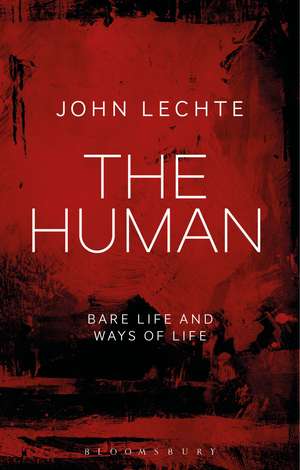The Human: Bare Life and Ways of Life
Autor John Lechteen Limba Engleză Hardback – 13 iun 2018
| Toate formatele și edițiile | Preț | Express |
|---|---|---|
| Paperback (1) | 174.47 lei 3-5 săpt. | +21.76 lei 10-14 zile |
| Bloomsbury Publishing – 25 dec 2019 | 174.47 lei 3-5 săpt. | +21.76 lei 10-14 zile |
| Hardback (1) | 716.00 lei 6-8 săpt. | |
| Bloomsbury Publishing – 13 iun 2018 | 716.00 lei 6-8 săpt. |
Preț: 716.00 lei
Preț vechi: 1028.51 lei
-30% Nou
Puncte Express: 1074
Preț estimativ în valută:
137.00€ • 143.43$ • 113.36£
137.00€ • 143.43$ • 113.36£
Carte tipărită la comandă
Livrare economică 05-19 aprilie
Preluare comenzi: 021 569.72.76
Specificații
ISBN-13: 9781350028135
ISBN-10: 1350028134
Pagini: 272
Dimensiuni: 156 x 234 mm
Greutate: 0.56 kg
Editura: Bloomsbury Publishing
Colecția Bloomsbury Academic
Locul publicării:London, United Kingdom
ISBN-10: 1350028134
Pagini: 272
Dimensiuni: 156 x 234 mm
Greutate: 0.56 kg
Editura: Bloomsbury Publishing
Colecția Bloomsbury Academic
Locul publicării:London, United Kingdom
Caracteristici
This book has important implications for contemporary questions of statelessness, human rights and democracy, and it approaches these topics in an original and highly rigorous way
Notă biografică
John Lechte is Professor of Sociology at Macquarie University, Sydney, Australia. He has published widely on French thought, particularly the work of Julia Kristeva. His most recent books are: Genealogy and Ontology of the Western Image and its Digital Future (2012) and he co-authored Agamben and the Politics of Human Rights: Statelessness, Images, Violence (2013). He has also published key essays on the thought of Georges Bataille, Julia Kristeva, Giorgio Agamben and Hannah Arendt, as well as on Derrida.
Cuprins
Introduction1. The Condition of Being Human 2. The Theory of the Polis and the Political in Western Philosophy: Implications for the Human3. How the Ordinary is Extraordinary: Arendt and Heidegger on the Polis 4. Approaching the Human and Freedom 5. The Human and the Animal: Bare Life and Transcendence 6. The Human and the Sacred in Bataille's Writing 7. The Human and/at the Moment of Death: Index and Image 8. The Human as Technics, Technicity, Technology and 'Way of Life' 9. Levinas on the Absolute Other as the Human 10. Life as Way of Life - As Acting BibliographyIndex
Recenzii
How can it be possible - as we so often see - for human life to be excluded, exploited, oppressed and, ultimately, destroyed in the very name of humanity? This is the crucial question that Lechte tackles in this philosophical tour de force. The domains of politics, ethics, economics, law and rights are all founded on the idea of the human and are meant to serve this end. Yet, this idea of humanity conceals a distinction, which has been with us since the Greeks, between human life as mere biological necessity, and human life as a 'way of life' - a division that allows certain ways of living to be denigrated. Lechte's bold and penetrating analysis forces us to question this assumption and, in doing so, disrupts the familiar categories of the Western political and philosophical tradition. Taking up from where Agamben left off, Lechte proposes a radical new understanding of the human as transcendent, as that which cannot be reduced to bare life. In doing so, he presents a fundamental challenge to the economic and political rationalities that today aim to objectify and control us.
I enthusiastically recommend John Lechte's The Human. Beginning with Hannah Arendt's experience of being a refugee, reduced to bare life and fleeing for her life, Lechte calls into question her claim that only a political life offers a remedy to reducing humans to bare life, and focuses on the transcendence of the human and the ways in which this transcendence is connected to various forms of life, political and otherwise.
A new way of thinking critically about the conception of freedom.
I enthusiastically recommend John Lechte's The Human. Beginning with Hannah Arendt's experience of being a refugee, reduced to bare life and fleeing for her life, Lechte calls into question her claim that only a political life offers a remedy to reducing humans to bare life, and focuses on the transcendence of the human and the ways in which this transcendence is connected to various forms of life, political and otherwise.
A new way of thinking critically about the conception of freedom.
